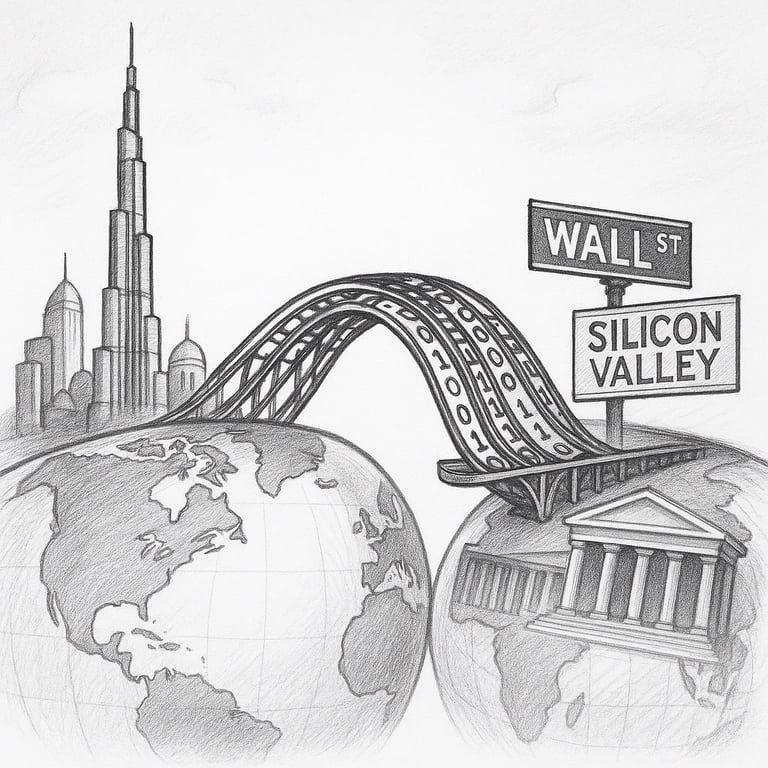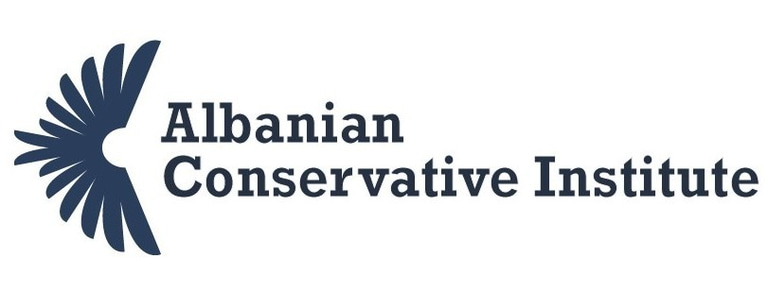Arkitektura e Financave Globale dhe Inteligjencës Artificiale
The Architecture of Global Finance and Artificial Intelligence (English version adjacent)
Enri Çeno
9/6/20256 min read


Një epokë e re po lind para syve tanë, por shumica ende nuk e kuptojnë thellësinë e saj. Po përjetojmë ndoshta revolucionin më të madh industrial në historinë e njerëzimit, një revolucion që nuk lidhet me avullin, me hekurudhat apo me elektricitetin, por me financën dhe inteligjencën artificiale. Po ndërtohet një arkitekturë e re globale, ku pasuria, teknologjia dhe fuqia politike po përzihen në mënyra që do të riformatojnë hartën e pushtetit botëror.
Në këtë skenë, Emiratet e Bashkuara Arabe shfaqen si një laborator i së ardhmes. Takimet e fundit në Abu Dhabi midis udhëheqësve më të lartë të Emirateve, Larry Fink – kreu i BlackRock, dhe përfaqësuesve të Forumit Ekonomik Botëror tregojnë se kjo nuk është thjesht një çështje investimesh. Është një strategji e menduar gjatë, ku kapitali sovran arab, gjigantët e financës globale dhe qendrat e mendimit ndërkombëtar po projektojnë të ardhmen. Me mbi 1.5 trilionë dollarë fonde sovrane vetëm në Abu Dhabi, me universitete të dedikuara vetëm për inteligjencën artificiale si MBZUAI, me qendra si Hub71 apo G42, Emiratet po bëhen nyja e një rrjeti të ri ekonomik dhe teknologjik që tejkalon përmasat e tyre gjeografike.
Në të njëjtën kohë, kompanitë financiare si BlackRock menaxhojnë pasuri që shkojnë përtej imagjinatës – mbi 12 trilionë dollarë. Këto shifra nuk janë thjesht statistikë, janë tregues të një realiteti të ri ku një grusht aktorësh të mëdhenj po marrin rolin e arkitektëve të së ardhmes. Ndërkohë, tokenizimi – një term i komplikuar që do të thotë transformimi i pasurive reale si toka, ndërtesat, infrastrukturat apo kapitali privat në forma digjitale të tregtueshme – po shihet si revolucioni financiar i dekadës. Deri në vitin 2030, sipas parashikimeve të Forumit Ekonomik Botëror dhe Boston Consulting Group, pasuri me vlerë mbi 16 trilionë dollarë do të jenë të tokenizuara. Kjo do të thotë transaksione më të shpejta, më të lira dhe më transparente, njësoj si të blesh një aksion në bursë, por në këtë rast mund të blesh një pjesë të një rrokaqielli apo të një ure strategjike. Emiratet po e pozicionojnë veten si liderë të këtij procesi duke ndërtuar rregullore të qarta dhe duke ofruar një klimë të favorshme që shumë vende perëndimore ende nuk e kanë.
Por fuqia më e madhe e së ardhmes nuk do të vijë vetëm nga financa. Inteligjenca artificiale, që sot shihet si një mjet teknologjik, po bëhet shtylla e re e ekonomisë botërore. Deri në vitin 2030, ajo do të shtojë mbi 15 trilionë dollarë në ekonominë globale. Çdo vend që nuk e integron në ekonominë dhe qeverisjen e tij do të mbetet jashtë loje. Emiratet kanë kuptuar këtë më shpejt se të tjerët: kanë krijuar universitete që edukojnë breza të tërë vetëm për AI, kanë investuar qindra miliarda në infrastrukturë kompjuterike, në qendra kërkimore dhe në kompani teknologjie. Këto nuk janë projekte prestigji, janë themelet e një rendi të ri botëror.
Nga ana tjetër, Amerika vazhdon të jetë epiqendra e kapitalit dhe teknologjisë. Me kompanitë e saj gjigante të Silicon Valley dhe Wall Street, SHBA mbetet lojtari dominues, duke tërhequr kapital, talent dhe ide. Por ndryshe nga e kaluara, nuk është më vetëm. Azia dhe Lindja e Mesme po ngrihen me një shpejtësi marramendëse. Kina, India, Emiratet, Arabia Saudite – po krijojnë një bosht të ri ku pasuria dhe teknologjia kombinohen për të ndërtuar një ekuilibër të ri global.
Dhe në këtë tablo, Europa duket më e përgjumura. E mbërthyer mes burokracive të saj, debatesh të pafundme mbi rregulloret dhe një mungese vizioni të unifikuar, ajo po rrezikon të mbetet spektatore e revolucionit më të madh të historisë moderne. Shumë milionerë po largohen nga Britania drejt Emirateve apo Amerikës. Vendet e Europës jugore po përpiqen të tërheqin pasuri përmes programeve të qëndrimit dhe qytetarisë, por këto janë zgjidhje të pjesshme, jo vizione strategjike.
Kjo është arsyeja pse ky revolucion nuk është thjesht ekonomik. Është politik. Sepse në momentin që financa, teknologjia dhe kapitali sovran kombinohen, kemi një hartë të re të pushtetit global. Kush kontrollon këto shtylla, kontrollon shekullin XXI. Për vendet e vogla si Shqipëria, por edhe për vendet e mëdha që ndoshta e kanë humbur ritmin si shumë shtete të Europës, ky është një paralajmërim i qartë: ose bëhesh pjesë e këtij transformimi, ose mbetesh në periferi. Nuk mjafton më të jesh konsumator i teknologjisë, duhet të jesh krijues, investues, pjesë e rrjetit.
Historia po shkruhet tani. Emiratet, BlackRock, Forumi Ekonomik Botëror, kompanitë e mëdha teknologjike dhe qendrat e reja të kapitalit sovran po ndërtojnë kapitujt që nesër do të studiohen në librat e ekonomisë dhe të shkencës politike. Ky është një revolucion i heshtur, por me pasoja më të thella se çdo lëvizje tjetër e shekujve të fundit. Dhe në këtë revolucion, askush nuk do të falet për përgjumje.
(English version)
A new era is being born before our eyes, but most still do not grasp its depth. We are perhaps experiencing the greatest industrial revolution in human history, one not tied to steam, railroads, or electricity, but to finance and artificial intelligence. A new global architecture is being built, where wealth, technology, and political power are merging in ways that will reshape the map of global influence.
In this scene, the United Arab Emirates appear as a laboratory of the future. The recent meetings in Abu Dhabi between the UAE’s top leaders, Larry Fink—the head of BlackRock—and representatives of the World Economic Forum show that this is not just about investments. It is a carefully designed strategy where Arab sovereign capital, global financial giants, and international think tanks are projecting the future. With more than $1.5 trillion in sovereign wealth funds in Abu Dhabi alone, with universities dedicated exclusively to artificial intelligence such as MBZUAI, with hubs like Hub71 or G42, the Emirates are becoming a node in a new economic and technological network that surpasses their geographic scale.
At the same time, financial companies like BlackRock manage assets beyond imagination—over $12 trillion. These figures are not mere statistics; they are indicators of a new reality where a handful of major players are taking on the role of architects of the future. Meanwhile, tokenization—a complex term meaning the transformation of real assets such as land, buildings, infrastructure, or private capital into tradeable digital forms—is seen as the financial revolution of the decade. By 2030, according to forecasts by the World Economic Forum and Boston Consulting Group, assets worth over $16 trillion will be tokenized. This means faster, cheaper, and more transparent transactions, similar to buying a stock on an exchange, but in this case you could buy a share of a skyscraper or a strategic bridge. The Emirates are positioning themselves as leaders in this process by building clear regulations and offering a favorable climate that many Western countries still lack.
But the greatest power of the future will not come only from finance. Artificial intelligence, which today is seen as a technological tool, is becoming the new backbone of the world economy. By 2030, it will add over $15 trillion to the global economy. Any country that does not integrate it into its economy and governance will be left out of the game. The Emirates have understood this faster than others: they have created universities that educate entire generations solely in AI, have invested hundreds of billions in computing infrastructure, research centers, and technology companies. These are not prestige projects; they are the foundations of a new world order. On the other hand, America continues to be the epicenter of capital and technology.
With its giant Silicon Valley and Wall Street companies, the U.S. remains the dominant player, attracting capital, talent, and ideas. But unlike the past, it is no longer alone. Asia and the Middle East are rising at a dizzying pace. China, India, the Emirates, Saudi Arabia—they are building a new axis where wealth and technology combine to construct a new global balance.
And in this picture, Europe seems the sleepiest. Trapped in its bureaucracies, endless regulatory debates, and lack of a unified vision, it risks remaining a spectator of the greatest revolution in modern history. Many millionaires are leaving Britain for the Emirates or America. Southern European countries are trying to attract wealth through residency and citizenship programs, but these are partial solutions, not strategic visions.
This is why this revolution is not merely economic. It is political. Because the moment finance, technology, and sovereign capital combine, we have a new map of global power. Whoever controls these pillars controls the 21st century. For small countries like Albania, but also for larger states that may have lost their pace like many in Europe, this is a clear warning: either you become part of this transformation, or you remain on the periphery. It is no longer enough to be a consumer of technology; you must be a creator, an investor, part of the network.
History is being written now. The Emirates, BlackRock, the World Economic Forum, the big tech companies, and the new centers of sovereign capital are building the chapters that will tomorrow be studied in economics and political science textbooks. This is a silent revolution, but with consequences deeper than any other movement of the past centuries. And in this revolution, no one will be forgiven for being asleep.
